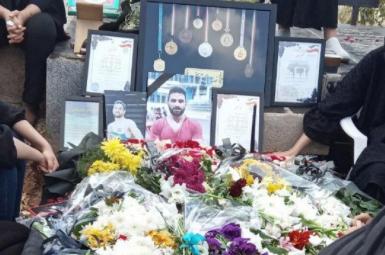
Iran Election Day Minus One: Blank Votes Could Shape Outcome
A day ahead of Iran’s controversial presidential election, Interior Minister Abdolreza Rahmani-Fazli pleaded Thursday with Iranians not to cast blank votes. Responding to hardliner media criticism of his deputy Jamal Orf, who on June 14 said polls pointed to a turnout of 37-47 percent, Rahmani-Fazli said the 37-percent low was based on old data and that the latest polls suggested a 47-percent turnout on Friday.
While opinion polls by their nature often do not accurately predict the outcome of an election, the factionalizing around the election has encouraged rampant extrapolation by those wanting to boost or undermine the election’s validity. The latest poll by the government-affiliated Iranian Students Polling Agency (ISPA), taken June 15-16 with a sample of 6,582, found 42 percent saying would vote or were likely to vote, with 33 percent saying they would not vote.
The picture is further confused by some reformists arguing that Iranians should go the polling stations and cast a blank vote to protest the watchdog Guardian Council not allowing their favored candidates to run. Blank, or void, votes could influence the election as victory in the first round – avoiding a second, run-off ballot between the two candidates with most votes – requires a clear majority, 50 percent plus one, of all votes including void ones.
While the IPSA poll was taken 15-16 June, at least partly before three candidates – the reformist Mohsen Mehralizadeh, and hardliners Saeed Jalili and Alireza Zakani – withdrew Wednesday, but IPSA claims their methodology allowed for that by asking respondents who they would vote for if their favored candidate withdrew.
The poll had Chief Justice Ebrahim Raisi (Raeesi) at 61.6 percent among those saying they would vote or were likely to vote, down 8.8 percentage points since June 11. Next was Mohsen Rezaei (Rezaee) with 18.25 percent (up 5.3 percentage points). Abdolnaser Hemmati was at 3.6 percent (up 1.2 percentage points), and Amir-Hossein Ghazizadeh at 2.6 precent (up 0.5 percentage points). International practice with opinion polls generally rounds to the nearest percentage, and gives a margin of error.
In the same poll, 18 percent of respondents who said they would or were likely to vote refused to say who they would be backing. ISPA said that in the last presidential election, in, 2017, only 4 percent in their final poll had refused to say who they would vote for.
In a televised speech on Wednesday [June 16] Supreme Leader Ali Khamanei said that Iranians should go to the polls in order to thwart the campaign by foreign-owned media and Iran’s “enemies.” But some activists in Iran have also urged a boycott.
Among reformists, both Abolfazl Ghadiani, a leading member of the influential Mujahedin of Islamic Revolution of Iran Organization (MIRIO) and outspoken Khamenei critic, and Mostafa Tajzadeh, who was not cleared to stand by the Guardian Council, have said they personally will not vote.
But other MIRIO members - including Behzad Nabavi, Mohsen Armin and Feyzolah Arab-Sorkhi – have this week urged voting for Hemmati, who has also been backed by Gholam-Hossein Karbaschi, general secretary of the center-right Kargozaran-e Sazandegi (Executives of Construction).
Pundits have long argued the turnout might be the lowest in the 42-year history of Iran’s Islamic Republic due to voters' disillusionment after three years of economic recession and the Guardian Council’s elimination of their favored candidates or those they believed could mount an effective challenge to Raisi.
Social media may also make the boycott campaign more influential than in past elections. Mobile internet has become more accessible even in remote areas, with official figures saying at least 80 percent of the population have access.









